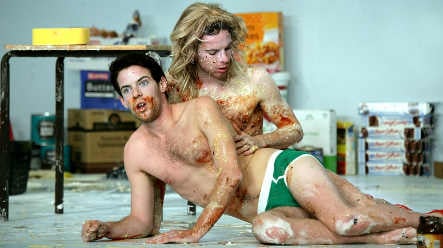If it is true that a divided audience marks artistic success, then “Over There” has already proved its worth.
The reviews that greeted the opening of the play in London at the beginning of March were extremely mixed, the most divergent that co-director Ramin Gray has ever had. “I’ve never had such a split response – some really terrible reviews, but some people absolutely love it,” he told The Local recently.
The casting of twins is both a unique theatrical device and a provocative allegory, and next week the play will get its first exposure to a German audience when it is performed at the Schaubühne am Lehniner Platz in Berlin. But Gray does not expect an entirely friendly response from the Germans either: “I’ve got a brother-in-law in Berlin who doesn’t want to come and see it on the basis of what he thinks it’s saying about east and west.”
Negative bemusement and anger was a recurring mood in the British critical reaction, with a lot of reviewers confessing bafflement at the 75-minute show, which depicts the re-uniting of western Franz and eastern Karl, played by Harry and Luke Treadaway, just before the fall of the Wall. This might have something to do with the excessive use of custard and cross-dressing. One confused reviewer said the play swings in style “between being irritating and strangely mesmerising,” while another didn’t see the piece as theatre at all, suggesting: “It’s more a sort of philosophical installation.”
Yet there have been positive responses too. The Guardian’s Michael Billington went along with its difficulties, finding a “perfect synthesis between story and subject” and observing that “Ravenhill vividly captures the west’s voyeuristic fascination with its puritanical other half.”
What united many British critics was a feeling that, whatever the wit and plausibility of the main idea, or the virtuosity of the two actors, the metaphor was laboured – the characters couldn’t survive as real people under the weight of the political symbolism they were carrying.
This reaction is at least in part down to its deliberate defiance of the British theatrical tradition. “I tried to work in a more German way, for want of a better word. And some of the critics really laid into that,” Gray said. “But it seemed ridiculous to do a play about Berlin without picking up some of what’s going on here.”
He noted that there has been more and more dialogue between British and German theatre in recent years. “A lot of British theatre people are envious of what seems to be possible on a German stage,” he said, admitting he is fascinated with the East German style in particular: “I have a load of respect and envy, in a way, for that work because it’s coming out of a much more rigorous tradition.”
Unlike many reappraisals of East German history, this play ignores the privations of living under a dictatorship and concentrates on the disconnection that East Germans felt and still feel in the new Germany. Ravenhill’s research in the former communist East apparently unearthed many dissatisfied souls, and in an interview with a British newspaper he spoke of how such dissatisfaction can only be dismissed as Ostalgie – a play on the German words for nostalgia of the East.
In many young East Germans, too young to actually remember the GDR, Ravenhill found anger towards their parents, which he compared with the anger of the ’68 generation towards its parents from the World War II generation. They’re angry, his play says, because this wasn’t a re-unification at all, but one country being consumed by another.
Gray summarises the playwright’s line of thought: “It so happens that Mark is going out with, and is about to marry, a German guy called Mark. And it was those two things – the big political event and the tiny personal event that led him to this idea of twins being reunited, having to get to know each other and the profound fear in any relationship that eventually you either eat the other person or you get eaten. You always have the problem, don’t you, whether the other person subsumes your identity, or you subsume theirs.”
Over There is being presented in two parallel showcases at London’s Royal Court theatre and the Schaubühne. At the Royal Court it was part of the Off The Wall season of new plays about Germany, while in Berlin it was commissioned for the Schaubühne’s international Festival on collapsing ideologies, entitled Digging Deep and Getting Dirty.
Gray is closely associated with this theatrical alliance, but he still does not promise himself a resounding triumph with Over There in Berlin: “Whether it’s in England or Germany – when you start talking about well-known, very recent history, people have very, very powerful feelings about it. The play is very bold and it’s saying something quite contentious.”
So this unsettling piece could find itself critically friendless in both cultures – not a twin, in fact, but an orphaned only child.
Over There is on at Berlin’s Schaubühne am Lehniner Platz on March 23, 24, 25, 7:30pm. Tickets: 030/89 00 23



 Please whitelist us to continue reading.
Please whitelist us to continue reading.